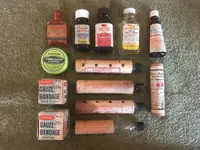Merthiolate is just a commercial name for Thimerosal an organic mercury salt. It's currently used as a preservative in vaccines, cosmetics, tattoo inks, eye drops and contact lens solutions as well as a disinfectant commonly called Merthiolate. Merthiolate is still used in some surgeries in the U.S. The half life of this mercury compound in the body is 7 days so you don't want to chug it daily.
Mercurochrome is just a commercial name for Merbromin. It also contains a small amount of Mercury but isn't being produced today because Thimerosal is cheaper and more effective.
None of the mercury compounds have been "banned". Mercury use and sales are still legal without license in the United States. It would be difficult and silly to outlaw an element.
Using mercury as a drug for human consumption is another story. In 1998 the FDA reclassified these and several other commonly used mercury compounds from "generally recognized as safe" to "new drug". What that meant was it couldn't be sold across state lines until the new drug was tested and approved for use (again). Merthiolate (Thimerosal) has been tested and re-approved but no company has put in the time and money to get Mercurochrome (Merbromin) re-approved so even though it's "legal" no company has a license to sell it as a drug in the United States.
Essentially what limits mercury distribution in the United States is the possibility of lawsuits adding to the cost of distribution. As long as mercury is stored and shipped within best practice it's safe and pretty much immune to lawsuits. In other words mercury is legal but sometimes difficult to obtain in some forms because - lawyers.
I have no idea of the value of these bottles. There is a fairly robust market for older medical implements. It's pretty typical for collectors to empty the drugs from the bottles in their collections probably because - lawyers.





